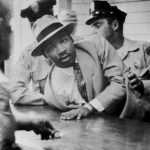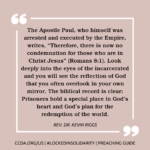There’s no way to adequately express the impact Dr. King has had on my life and ministry. Growing up in Atlanta, I have been indelibly marked by King’s legacy. His theology, ethics, and ministry framed much of my discipleship and personified what Christian community development entailed. However, mainstream America has domesticated King’s legacy; his radical vision has been appropriated and recast as a colorblind dream, and his prophetic witness has been reduced to a generic message of love and integration. This truncated recollection of King led Cornel West to conclude that King is “the most evident example of a sanitized national icon.” We must #ReclaimKing.
When Martin’s commitment to the poor, love for the least of these, and critique of economic inequality and militarism are not at the forefront of how he’s remembered, we dishonor him. These virtues were at the core of King’s identity, particularly in his later years. In 1966, King said in a sermon, “I choose to identify with the underprivileged. I choose to identify with the poor. I choose to give my life for the hungry, I choose to give my life for those who have been left out of the sunlight of opportunity. […] This is the way I’m going. If it means suffering a little bit, I’m going that way. If it means sacrificing, I’m going that way. If it means dying for them, I’m going that way, because I heard a voice say ‘Do something for others.’” King’s life and witness not only provided the moral framework for the Civil Rights Movement, he also crystalized what servant leadership looked like for the Church.
King prophetically reminded the Church of its purpose in the world. He said, “The church must be reminded that it is not the master or the servant of the state, but rather the conscience of the state. It must be the guide and the critic of the state, and never its tool. If the church does not recapture its prophetic zeal, it will become an irrelevant social club without moral or spiritual authority.” King also contextualized Christian ethics for our era; his theology was practical and it prompted believers to participate in God’s liberative work in the world. King stressed the Pauline notion of faith expressing itself in sacrificial love. His teaching on the Good Samaritan epitomized this: “the first question which the priest and the Levite asked was: ‘If I stop to help this man, what will happen to me?’ But… the Good Samaritan reversed the question: ‘If I do not stop to help this man, what will happen to him?’” This self-giving ethic of looking to the interest of others rather than one’s self defined King’s life.
King believed that Christians were called to be concerned not only with saving souls, but also with holistic ministry. He consistently cautioned the Church not to neglect praxis and thereby forsake justice. King said “The gospel at its best deals with the whole man [sic], not only his soul but his body, not only his spiritual well-being, but his material well-being. Any religion that professes to be concerned about the souls of men and is not concerned about the slums that damn them, the economic conditions that strangle them and the social conditions that cripple them is a spiritually moribund religion awaiting burial.” King denounced all portrayals of God as being unconcerned with the physical circumstances of human suffering. King understood injustice, oppression, and racism as the effects of individual and systemic sin.
King proclaimed that Christians worship a God of justice and that this God summons the Church to advocate, pursue, and embody justice in the face of injustice, whenever and wherever we witness it. King disdained Christianity that trended towards otherworldliness; he believed that Christian faith must be concretely expressed and that this expression evokes social change. King asserted, “It’s all right to talk about ‘streets flowing with milk and honey,’ but God has commanded us to be concerned about the slums down here, and his children who can’t eat three square meals a day. It’s all right to talk about the new Jerusalem, but one day, God’s preacher must talk about the new New York, the new Atlanta, the new Philadelphia, the new Los Angeles, the new Memphis, Tennessee.” For me, and millions of others, Dr. King was a God-ordained modern prophet. His witness has blessed my life and has profoundly shaped my ministry. As we reclaim King, we enable the prophetic message that he embodied to help guide us as we seek to bear witness to Christ’s love and justice in the world.
 Dominique DuBois Gilliard was born and raised in metro Atlanta. He completed his undergraduate studies in the heart of Atlanta, at Georgia State University, where he double majored in History and African American Studies. After graduating, he went on to earn a Master’s in history, with an emphasis on race, gender, and class in the U.S., focusing on the 19th – 21st Centuries. While he planned on pursuing his Ph.D in history after graduating, God summoned him to attend North Park Theological Seminary. He earned his Master’s of Divinity from North Park and went on to teach courses at the seminary in the fields of Christian Ethics, Theology and Reconciliation. Dominique serves on the board of directors for the Christian Community Development Association (CCDA) and as the director of racial reconciliation pilgrimages for the Pacific Southwest Conference of the ECC.
Dominique DuBois Gilliard was born and raised in metro Atlanta. He completed his undergraduate studies in the heart of Atlanta, at Georgia State University, where he double majored in History and African American Studies. After graduating, he went on to earn a Master’s in history, with an emphasis on race, gender, and class in the U.S., focusing on the 19th – 21st Centuries. While he planned on pursuing his Ph.D in history after graduating, God summoned him to attend North Park Theological Seminary. He earned his Master’s of Divinity from North Park and went on to teach courses at the seminary in the fields of Christian Ethics, Theology and Reconciliation. Dominique serves on the board of directors for the Christian Community Development Association (CCDA) and as the director of racial reconciliation pilgrimages for the Pacific Southwest Conference of the ECC.





